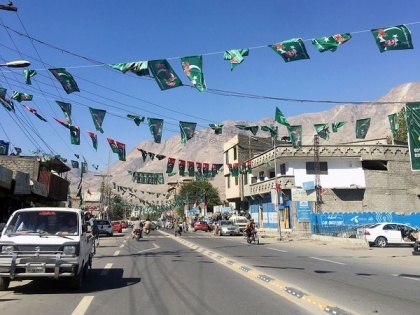PoK: Lessons of the Teachers Movement
By ANI | Published: July 13, 2023 07:33 PM2023-07-13T19:33:28+5:302023-07-13T19:35:09+5:30
By Dr Amjad Ayub Mirza Muzaffarabad [PoK], July 13 : On July 11, hundreds of policemen and Para-military rangers ...

PoK: Lessons of the Teachers Movement
By Dr Amjad Ayub Mirza
Muzaffarabad [PoK], July 13 : On July 11, hundreds of policemen and Para-military rangers were called in Muzaffarabad which is the capital of Pakistan-occupied Kashmir (PoK).
Meanwhile, the ruthless crackdown on the officials and activists of Azad Kashmir Schools Teachers Organisation (AKSTO), that begun on July 7, continued unabated.
Hundreds of AKSTO officials, activist including female teachers were arrested and locked up in local police stations.
It was under these circumstances that the leadership of the movement succumbed and agreed to call off the long march towards Muzaffarabad in return for a meeting with the government officials.
It was a trap. The purpose of the meeting, which was attended by no less than 48 teachers, was without a doubt a maneuver on part of the government to break the momentum of the movement.
And it worked. Why?
This why is what I want to investigate in this write-up.
From the start the AKSTO had a very narrow scope. It revolved around the demand of up gradation of the scales of the school teachers.
The agenda of the struggle did not address the broader issues related with the economic crisis, lack of political rights and Pakistan’s total control over PoK’s finances.
The leadership of AKSTO was not a revolutionary one. They grew up learning a false historical narrative at schools taught by their predecessors that includes in the curriculum a subject called ‘Pakistan Studies’.
Their worldview is derived from the hateful and communal ‘ideology’ of Pakistan founder Muhammad Ali Jinnah that is known as the ‘Two-Nation theory’.
This theory is based on the false pretext that religion can be the foundation stone of national identity; something that was refuted only after 25 years of Pakistan’s coming into being when the Bengali people of East Pakistan rebelled and gained their independence from the state of Pakistan.
The leadership of AKSTO has also preached loyalty to the Pakistan army at schools and have not investigated the world famous revolutions or independence struggles such as the English industrial revolution, the French revolution or even the Russian revolution.
They have no deep understanding of the freedom struggle of the sub-continent since a poisonous religious demagogic narrative tarnishes it.
It should therefore not come as a surprise that during their speeches delivered by AKSTO leaders they kept referring to Pakistan as their big brother so that they were not labelled as Indian agents or their movement an Indian RAW sponsored movement.
This movement was built on a weak ideological foundation or no foundation at all. Their political consciousness was based on the world outlook that they receive at the Jumma (Friday) prayers and not through scientific research of the law of motion of society or deep investigative knowledge of societal protests campaigns or movements.
The AKSTO lack a concrete political program that could link their grievances and low scale and salaries to the fact that they are an oppressed people and that unless they free themselves from the occupation of Pakistan they cannot become masters of their natural resources and therefore their destiny.
ASTKO did not have a plan-B to tackle the crackdown that they had to face from the state machinery. This again proves that the AKSTO lacked experience in tackling repression during a campaign.
They did not, or may be even refused to, take other trade unions and civil society organisation on board as allies. This was a crucial deficiency that the AKSTO movement suffered from all the way.
With a broad based campaign supported by, for instance, the pensioners association, the transporters association, the clerks association, trader’s organisation, student bodies etc. AKSTO stood no chance of succeeding.
This is not the first and will not be the last movement that has met a devastating fate in PoK.
Unless study groups are organised by the front-line cadre of the struggle for freedom from Pakistan and reuniting with India, the mind-set of the vanguard leadership and the fighting troops cannot be changed.
Only by patient, persistent and consistent efforts made by a politically and philosophically educated cadre, we as a people will never be never able to gain our independence form colonialism and the success of our struggle can never be guaranteed.
Dr Amjad Ayub Mirza is an author and a human rights activist from Mirpur in PoK. He currently lives in the exile in the UK.
Disclaimer: This post has been auto-published from an agency feed without any modifications to the text and has not been reviewed by an editor
Open in app